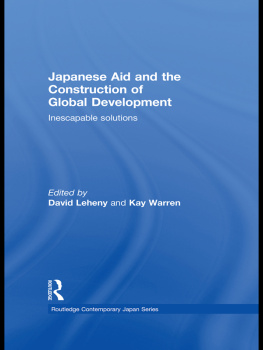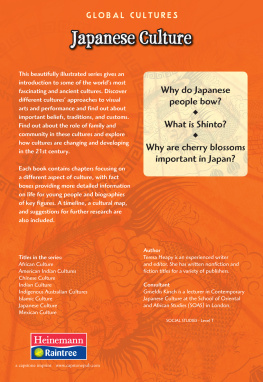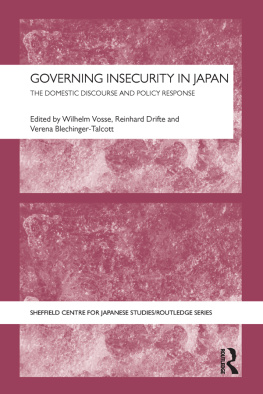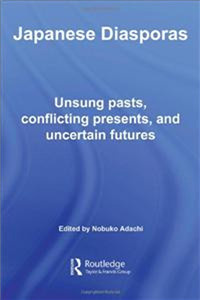Japanese Aid and the Construction of Global Development
Instead of asking the usual questions about Japanese aidWhy is Japanese aid so different from that of other donors? Is Japanese aid effective?this collection takes it as axiomatic that Japanese aid actors are now working in a contentious environment affected by changing global norms of aid.
Japanese Aid and the Construction of Global Development analyzes the changing political contexts, both at home and abroad, within which Japanese aid officials develop their programs. It tracks the tensions facing aid officials as they seek to negotiate between a long-term organizational bias in the Japanese government of promoting growth-oriented policies, and new demands for Japan to engage a broader array of human security concerns. In the third section, contributors provide case studies of new policies designed to cope with transnational human security issues, particularly involving environmental protection, gender equality, and the spread of HIV/AIDS. Finally, the book turns its lens back to Japan, with chapters on how changing aid relationships alter Japans ability to cope with transnational problems like refugee flows, sex trafficking, and terrorism.
This book will be of interest to students and scholars of the politics and culture of global development, Japanese politics and foreign policy, international relations, and international law.
David Leheny is the Henry Wendt III 55 Professor of East Asian Studies at Princeton University.
Kay Warren is the Charles C. Tillinghast Jr. 32 Professor of International Studies and Professor of Anthropology at Brown University.
Routledge Contemporary Japan Series
1 A Japanese Company in Crisis
Ideology, Strategy, and Narrative
Fiona Graham
2 Japans Foreign Aid
Old Continuities and New Directions
Edited by David Arase
3 Japanese Apologies for World War II
A Rhetorical Study
Jane W. Yamazaki
4 Linguistic Stereotyping and Minority Groups in Japan
Nanette Gottlieb
5 Shinkansen
From Bullet Train to Symbol of Modern Japan
Christopher P. Hood
6 Small Firms and Innovation Policy in Japan
Edited by Cornelia Storz
7 Cities, Autonomy and Decentralization in Japan
Edited by Carola Hein and Philippe Pelletier
8 The Changing Japanese Family
Edited by Marcus Rebick and Ayumi Takenaka
9 Adoption in Japan
Comparing Policies for Children in Need
Peter Hayes and Toshie Habu
10 The Ethics of Aesthetics in Japanese Cinema and Literature
Polygraphic Desire
Nina Cornyetz
11 Institutional and Technological Change in Japans Economy
Past and Present
Edited by Janet Hunter and Cornelia Storz
12 Political Reform in Japan
Leadership Looming Large
Alisa Gaunder
13 Civil Society and the Internet in Japan
Isa Ducke
14 Japans Contested War Memories
The Memory Rifts in Historical Consciousness of World War II
Philip A. Seaton
15 Japanese Love Hotels
A Cultural History
Sarah Chaplin
16 Population Decline and Ageing in Japan
The Social Consequences
Florian Coulmas
ZainichiKorean Identity and Ethnicity
David Chapman
18 A Japanese Joint Venture in the Pacific
Foreign Bodies in Tinned Tuna
Kate Barclay
19 JapaneseRussian Relations, 19072007
Joseph P. Ferguson
20 War Memory, Nationalism and Education in Post-War Japan, 19452007
The Japanese History Textbook Controversy and Ienaga Saburos Court Challenges
Yoshiko Nozaki
21 A New Japan for the Twenty-first Century
An Inside Overview of Current Fundamental Changes and Problems
Edited by Rien T. Segers
22 A Life Adrift
Soeda Azembo, Popular Song and Modern Mass Culture in Japan
Translated by Michael Lewis
23 The Novels of Oe Kenzaburo
Yasuko Claremont
24 Perversion in Modern Japan
Psychoanalysis, Literature, Culture
Edited by Nina Cornyetz and J. Keith Vincent
25 Homosexuality and Manliness in Postwar Japan
Jonathan D. Mackintosh
26 Marriage in Contemporary Japan
Yoko Tokuhiro
27 Japanese Aid and the Construction of Global Development
Inescapable Solutions
Edited by David Leheny and Carol Warren
First published 2010
by Routledge
2 Park Square, Milton Park, Abingdon, Oxon OX14 4RN
Simultaneously published in the U.S.A. and Canada
by Routledge
270 Madison Ave, New York, NY 10016
Routledge is an imprint of the Taylor & Francis Group, an informa business
This edition published in the Taylor & Francis e-Library, 2009.
To purchase your own copy of this or any of Taylor & Francis or Routledges collection of thousands of eBooks please go to www.eBookstore.tandf.co.uk.
2010 Editorial selection and matter, David Leheny and Kay Warren.
Individual chapters, the contributors.
All rights reserved. No part of this book may be reprinted or reproduced or
utilized in any form or by any electronic, mechanical, or other means, now
known or hereafter invented, including photocopying and recording, or in any
information storage or retrieval system, without permission in writing from the
publishers.
British Library Cataloguing in Publication Data
A catalogue record for this book is available from the British Library
Library of Congress Cataloging in Publication Data
Japanese aid and the construction of global development: inescapable solutions /
edited by David Leheny and Kay Warren.
p. cm.(Routledge contemporary Japan series; 27)
1. Economic assistance, Japanese. 2. Economic developmentDeveloping
countries. 3. JapanForeign economic relations. I. Leheny, David Richard,
1967-II. Warren, Kay B., 1947
HC465.E44J37 2009












